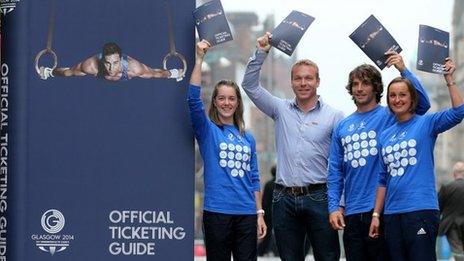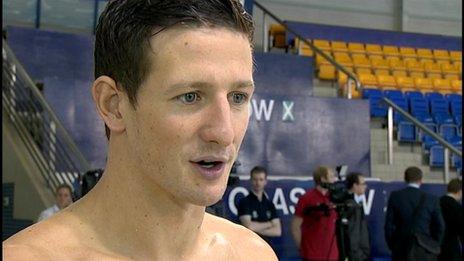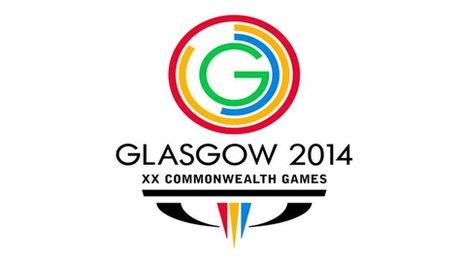Glasgow 2014: High demand for Commonwealth tickets
- Published
Interview - Olympic silver medallist Michael Jamieson
Glasgow's Commonwealth Games, external organisers said they were "delighted by the enthusiastic response" to the first day of ticket sales for next year's games.
They said they "appreciated the patience" shown by customers as high demand led to waiting times of more than an hour on Monday morning.
Organisers said there was no need to rush as the public had four weeks to place requests for tickets.
After that period, tickets will be allocated by a "fair and simple draw".
A Glasgow 2014 spokeswoman said: "We have already processed many thousands of applications through our website and continue to do so as quickly as possible."
She added: "But this is not a sprint - everyone has until 16 September to make their choices and get their applications in and we encourage everyone to get involved in Scotland's biggest-ever festival of world-class sport."
The 11-day games, which begin on 23 July 2014, will see 4,500 athletes compete in 17 sports across 14 venues.
An official ticket guide was released last month and the first phase ticketing process runs until 16 September.
Olympic silver medallist swimmer Michael Jamieson marked the start of sales by diving into the refurbished pool at the Tollcross International Swimming Centre.
Ty Speer, deputy chief executive of Glasgow 2014, said: "There is no advantage to putting your application in on the first day, a day in the middle or at the end.
"We will not process any applications until that phase closes.
"Our advice to everybody is go online or grab a copy of our ticketing brochure, sit down with family and friends and work out what works for you."
Lessons learned
Applications can be made online with debit or credit cards or by post, using the form in the ticket guide.
The ticket-buying process will be operated by Ticketmaster, who sold 10.9 million Olympics tickets but came in for criticism over the system of bidding for batches of tickets.
The Commonwealth Games organisers have been keen to stress that lessons have been learned from the London Olympics ticketing problems.
They said they had concentrated on keeping the ticketing process simple, making sure that payment was easy and allowing fans to be confident that there are lots of tickets available.
At last year's Olympics, blocks of empty seats reserved for "the Olympic family" or sponsors were a major talking point at early events, so Mr Speer said the Glasgow games had made a commitment that at least 70% of all seats, for all sessions at all venues, would be available to the public.
Mr Speer said a second phase of ticket sales would run from later in October, with tickets on general sale.
But he said the aim of the first round was to give as many people as possible an equal chance of getting tickets.
He said people would either get exactly what they wanted when applying for a session or nothing at all.
Varied prices
He said there was no chance of people being given tickets for diving if they applied for a swimming session and they would not get three tickets if they applied for four.
Ticket prices start from £15 for adults, with half-price concessions on the cheapest tickets available for children and the over-60s.
Organisers said about 60% of the tickets were priced at £25 or less and all included use of public transport in the local area on the day of the event.
However, the more popular sessions could cost much more than that.
Spectators hoping to witness prized events such as the 100m sprint final at Hampden on Monday 28 July, which could feature Jamaica's Usain Bolt, will pay between £30 and £90.

Sir Chris Hoy helped launch the Official Ticketing guide with Jade Nimmo, Colin Gregor and Susan Egelstaff
The only seats priced higher are the £120 ringside views for certain boxing sessions.
Tickets for the opening ceremony - which takes place on Wednesday 23 July - will cost between £40 and £250. The closing ceremony on Sunday 3 August will be slightly cheaper, with a top price of £200.
Despite claims from the organisers that the ticketing strategy was "family-friendly", concerns have been raised over the limit on the number of tickets for which people can apply at certain sessions.
The majority of the more popular events, such as swimming, athletics and track cycling, will have a four-ticket per application limit, which could exclude larger families.
Mr Speer said for about 60% of the sessions the ticket limit was eight or 10 per application.
However, it was lowered to four for sessions "where we feel confident there will be enormous demand".
Mr Speer said: "We want to make sure we allow the greatest number of people to have the chance to have those tickets and obviously if people are coming in and potentially ordering 10 tickets that, by definition, reduces the number of families and households that will get a chance to go. So it is really about fairness."
- Attribution
- Published19 August 2013

- Attribution
- Published16 July 2014
